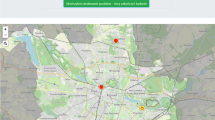Abstract
For centuries, mapping activity has been carried out by experts, in particular for military purposes or land administration, infrastructure planning, and environmental monitoring. It was only within the last decade that technological innovations in computer science, positioning, and navigation devices have facilitated citizens direct involvement in urban mapping. In particular, crowdsourced mapping shows potentials for urban and participatory planning. It allows people to create and share geographical information with few costs and expertise. Real-time data collection can have different aims: thematic map creation, collective story-telling, or social empowerment and counter-geography. Some critical points still exist. However, virtual maps can be considered alternative tools to enhance civic participation and to identify spatial and social opportunities for urban transformation.
Access this chapter
Tax calculation will be finalised at checkout
Purchases are for personal use only
Similar content being viewed by others
Notes
- 1.
“The term ‘Web 2.0’ (2004–present) is commonly associated with web applications that facilitate interactive information sharing, interoperability, user-centered design, and collaboration on the World Wide Web.” (Batty et al. 2010).
- 2.
The experiences presented in the paper are maps that use existing accessible geographic representations, like GoogleMap or OpenStreetMap, and customize them adding new contents via GPS or mobile phones connected to Internet.
- 3.
The term, coined in 2006 on Wired magazine, refers to a form of user’s engagement and interaction that exploits what Surowiecki calls The Wisdom of Crowds in his book of the same name (2004). “Crowdsourcing operationalizes crowd wisdom, and it is a mechanism for leveraging the collective intelligence of online users toward productive ends” (Bradham 2009, p. 10).
- 4.
Crowdfunding is a collaborative process in which people can support organizations and projects with their own money. The main principles of crowdfunding can be found in Falossi’s Kapipalist Manifesto (from the name of the website Kapipal). Crowdfunding web platforms facilitate the encounter of demand and offer around projects’ fund raising. They can treat several domains or focus on a specific thematic. “Equity-based” crowdfunding has recently been regulated in the United States (Wikipedia source).
References
Batty M, Hudson-Smith A, Milton R, Crooks A (2010) Map mashups, Web 2.0 and the GIS revolution. Annals of GIS 16(1):1–13
Boyer B, Hill D (2013) Brickstarter. Sitra, Helsinki, p 10–20. Available at: http://brickstarter.org/ (accessed in October, 2013)
Brabham DC (2009) Crowdsourcing the Public Participation Process for Planning Projects. Planning Theory 8:242–263
De Carli B (2012) Counter-mapping. Un caso a Nairobi. Territorio 61:104–109
Di Siena D (2011) Nuovi strumenti e metodi innovativi per la Pianificazione Partecipata. http://urbanohumano.org/p2purbanism/nuovi-strumenti-e-metodi-innovativi-per-la-pianificazione-partecipata/ (accessed in October, 2013)
Goodchild MF (2007) Citizens as sensors: the world of volunteered geography. GeoJournal 69(4):211–221
Goodchild MF, Li L (2012) Assuring the quality of volunteered geographic information. Spatial Statistics 1:110–120
Heipke C (2010) Crowdsourcing geospatial data. ISPRS Journal of Photogrammetry and Remote Sensing 65:550–557
Lange A (2012) Against Kickstarter Urbanism. Available at: http://observatory.designobserver.com/alexandralange/feature/against-kickstarter-urbanism/34008/ (accessed in October, 2013)
Lotus International 149 (2012) Lotus in the Fields. Mapping, p 70–71
Surowiecki J (2004) The Wisdom of Crowds: Why the Many Are Smarter than the Few and How Collective Wisdom Shapes Business, Economies, Societies, and Nations. Doubleday, New York
Turner A (2006) Introduction to Neogeography. O’Reilly Media Publisher, p 54
Villa D (2011) Visualizing Crowdsourced Urban Landscapes. The impact of social networking in participatory practices. My Ideal City. Scenarios for the European City of the 3rd Millennium. Edited by Sara Marini. IUAV, Venezia
Author information
Authors and Affiliations
Corresponding author
Editor information
Editors and Affiliations
Rights and permissions
Copyright information
© 2014 Springer International Publishing Switzerland
About this chapter
Cite this chapter
Mattioli, C. (2014). Crowd Sourced Maps: Cognitive Instruments for Urban Planning and Tools to Enhance Citizens’ Participation. In: Contin, A., Paolini, P., Salerno, R. (eds) Innovative Technologies in Urban Mapping. Sxi — Springer per l’Innovazione / Sxi — Springer for Innovation, vol 10. Springer, Cham. https://doi.org/10.1007/978-3-319-03798-1_13
Download citation
DOI: https://doi.org/10.1007/978-3-319-03798-1_13
Publisher Name: Springer, Cham
Print ISBN: 978-3-319-03797-4
Online ISBN: 978-3-319-03798-1
eBook Packages: EngineeringEngineering (R0)




